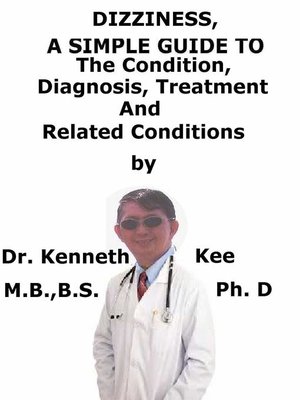Dizziness, a Simple Guide to the Condition, Diagnosis, Treatment and Related Conditions
ebook
By Kenneth Kee

Sign up to save your library
With an OverDrive account, you can save your favorite libraries for at-a-glance information about availability. Find out more about OverDrive accounts.
Find this title in Libby, the library reading app by OverDrive.



Search for a digital library with this title
Title found at these libraries:
| Library Name | Distance |
|---|---|
| Loading... |
This book describes Dizziness, Diagnosis and Treatment and Related Diseases
This week I had a patient who has the sensation of dizziness which occurred after an operation on his sinuses to remove bloody pus.
He felt the dizziness worse when moving from the lying to the upright position.
Whether it was the after effect of the anesthesia or the operation itself, he was certainly paler than usual and feeling tired.
He was told to return to his ear-nose and throat surgeon for a review including X-ray of his sinuses and a full blood count.
His blood tests showed evidence of mild anemia (low hemoglobin) and low red blood cells count possibly from the loss of blood from the sinusitis and during the operation.
He was told to take Iron with folic acid and multivitamins to build up his blood, stemetil (prochlorperazine) for his dizziness and told to have adequate rest and eat more red meat.
In the meantime his MRI showed evidence of mucosal thickening of the sinus walls and evidence of mild infection.
An antibiotic gel was inserted into his sinuses to try to clear the sinus infection.
In spite of all these measures he still felt dizzy but not as bad as previously.
Since there was no evidence of malignancy, I tried to reassure him and not to worry too much as stress and worry by itself can cause the dizziness.
Dizziness has been used to depict different sensations.
True dizziness is a feeling of light-headedness, unsteadiness or simply feeling faint.
It involves the sensory organs, specifically the eyes and ears, so it can occasionally cause fainting.
Most causes of dizziness are not severe, and they either rapidly get better on their own or are easy to treat.
Dizziness is not a medical disorder, but rather a symptom of different disorders.
The symptom of "dizziness" needs to be separated from vertigo, which is a spinning sensation feeling that the room is moving, or that the person is moving when they are not (or even a floating sensation).
Vertigo is a feeling that the patient is spinning or moving, or that the world is spinning around the patient.
Balance difficulty is also a separate disorder where a person feels they are about to fall, has difficulty keeping balanced, or may actually fall.
It may also feel like motion sickness or as if the patient is leaning to one side.
Vertigo and disequilibrium may cause a feeling of dizziness, but those 2 terms depict different symptoms.
Disequilibrium is a loss of balance or equilibrium.
True dizziness is the sensation of lightheadedness or near fainting.
Occasional dizziness is not something to worry about.
The patient should call the doctor immediately if the patient is feeling repeated episodes of dizziness for no apparent reason or for a prolonged period.
Lightheadedness happens when the brain does not get enough blood.
This may happen if:
1.The patient has a sudden drop in blood pressure.
2.The body does not have enough water (is dehydrated) due to vomiting, diarrhea, fever, and other disorders.
3.The patient gets up too quickly after sitting or lying down (this is more frequent in older people).
4.Lightheadedness may also happen if the patient has the flu, low blood sugar, a cold, or allergies.
More serious disorders that can lead to light-headedness are:
1.Heart disorders, such as a heart attack or abnormal heart beat
2.Stroke
3.Bleeding inside the body
4.Shock (extreme drop in blood pressure)
If any of these serious disorders are present, the patient will normally also have symptoms like chest pain, a feeling of a racing heart, loss of speech, change in...







